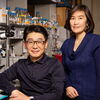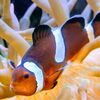2022-01-20
- The Department of Cell and Developmental Biology profiles PhD student Janhavi Kolhe, recipient of the Tom and Cynthia Cycyota Research Scholarship.
- 2022-01-19 - Twenty research projects are sharing slightly more than $1.4 million in funding through the Jump ARCHES research and development program to address a variety of vexing medical challenges including neurological testing for children and athletes (such as concussions), migraines, and stress among nurses enduring pandemic challenges at home and at work. The Jump ARCHES program is a partnership...
- 2022-01-10 - Professor John M. Clark, Jr., one of the earliest members of what later became the Department of Biochemistry at the University of Illinois Urbana-Champaign, passed away peacefully on Jan. 2, 2022, in Estero, Fla. He was 89 years old.
- 2022-01-10 - Meet MCB: Dr. Christian-Hinman’s lab focuses on understanding the neural mechanisms linking epilepsy and comorbid reproductive endocrine disorder.
- 2022-01-05 - Coral reefs have thrived for millions of years in their shallow ocean water environments due to their unique partnerships with the algae that live in their tissues. Corals provide a safe haven and carbon dioxide while their algal symbionts provide them with food and oxygen produced from photosynthesis. Using the corals Orbicella annularis and Orbicella faveolate in the southern Caribbean,...
- 2021-12-21 - Faculty and staff members from the University of Illinois Urbana-Champaign have been chosen to participate in the Big Ten Academic Alliance Academic Leadership Program and the Big Ten Academic Alliance Department Executive Officer Seminar.
- 2021-12-17 - Mice with a genetic mutation that’s been observed in patients with epileptic encephalopathy, a severe form of congenital epilepsy, exhibit not only the seizure, developmental and behavioral symptoms of the disorder, but also neural degeneration and inflammation in the brain, University of Illinois Urbana-Champaign researchers found in a new study. The findings highlight the mutation as an...
- 2021-12-15 - Integrated research, innovative education, and entrepreneurship activities are foundational to the Mayo Clinic & Illinois Alliance’s mission to advance clinical research and translation. Key to that mission is training the next generation of biomedical scientists.
- 2021-12-15 - You Jin Song, a third year Ph.D. candidate in Cancer Center at Illinois (CCIL) researcher Kannanganattu Prasanth’s lab, is studying the effects of MALAT1, a long-noncoding RNA that is believed to play an important role in many cancers including breast and lung cancer. This project is supported by a CCIL Graduate Cancer Scholarship.
- 2021-12-10 - CABBI and the Carl R. Woese Institute for Genomic Biology (IGB) are sponsoring six undergraduate students from the University of Illinois Urbana-Champaign to take part in the International Genetically Engineered Machine (iGEM) Competition during Spring and Summer 2021. The annual iGEM Jamboree is in the fall.
- 2021-12-10 - The Cancer Center at Illinois and the Microbial Systems Initiative held the Cancer and Microbes Workshop as part of a new partnership formed between the CCIL and the MSI to promote collaboration at the interface of microbial sciences and cancer research.
- 2021-12-09 - Congratulations to the University of Illinois scientists who were part of two teams selected as finalists for a prestigious award that celebrates outstanding achievement in high-performance computing.
- 2021-12-07 - Ocean pollution is unfortunately becoming more commonplace, raising concerns over the effect of chemicals that are leaching into the water. In a new study, researchers have discovered how these chemicals can affect the reproduction in common anemonefish Amphiprion ocellaris.
- 2021-12-06 - In order to cause disease, the human pathogen Staphylococcus aureus must adapt to the changing host environment. Many of these adaptations are mediated through two-component signal transduction systems (TCSs) that coordinate gene expression in response to environmental stimuli. In a new study reported in the Journal of Bacteriology, researchers at Illinois provide insight into the signal...
- 2021-12-02 - In the last decade, scientists have discovered that the antiviral system known as cGAS-STING is an important innate immune system in humans because it senses double-stranded DNA in cytoplasm resulting from viral and bacterial infections. Recent research shows that the cGAS-STING system may have its evolutionary origin from bacteria. cGAS-STING shares similar mechanisms to cyclic-oligonucleotide-...














